- Home
- Ian McDonald
Sacrifice of Fools Page 8
Sacrifice of Fools Read online
Page 8
Nothing. And you could not stand the guilt, that you were just ordinary wee people with ordinary wee lives and the world was never going to resound to your names and achievements. So you try and live it through your children. You commissioned and sent them forth to do what you couldn’t.
OK, Rosh, but you’re still Detective Sergeant Dunbar driving up the Whiterock Road on a Thursday morning, because if you turned in the warrant and piece in your bag you couldn’t live with the guilt either.
And how do you, Mr Andrew Gillespie, three years for conspiracy to murder, come to be driving up this self-same Whiterock Road where they paint the gable ends with murals of the saints of the new Ireland: St Gerry the Peacemaker and St Brendan the Escapee and St Bobby the Anorexic and SS Donna and Sean and Nessun of Gibraltar (Martyred)? I suppose you grew up with your own Dulux pantheon watching over you; I mean, it’s not as if anyone believes in these beings any more.
The taxi turns left into a reclaimed industrial site. The Outsiders have settled among the ruins of the old plant. Shawls of plastic skin stuff are thrown over old red brick and steel cladding. Dunbar parks at the limit of the zoom lens, but two Outsider kids on BMXs spy her and cut across the scabby concrete to check out the stranger.
‘Are you taking pictures?’ the larger one on the bigger bike asks. They’re both long, lithe, impossible to age or sex. Their deep voices are disturbing, like men dressed up as schoolboys.
‘I’m at the Art College,’ Dunbar lies — rather well, she thinks. ‘Doing a photography project.’
‘Can we be in your pictures?’
‘Certainly.’ Provided I can get that cold-looking man in the leather jacket who is talking with one of your relatives into shot as well. She makes notes in her NIPS notebook. ‘What is this place?’ she asks the kids.
‘Interesting Weather Hold,’ they answer together.
Andy Gillespie, arrived Interesting Weather Hold, Whiterock Industrial Park, 10.25, departed 10.45. Talked with two Outsiders.
‘Are you not going to take any more photographs?’ the Outsider kids ask.
‘I’m done. Thanks for your help. By the way, shouldn’t you be in school?’ Always the cop, Rosh.
‘What’s school?’ the smaller one asks the taller one.
North now, along the Ballygomartin Road, between the foot of Divis mountain and the grey estates of the 1970s. Left up Glencairn, winding up into the hills, climbing away from the estates past tinker caravans and scavenged car wrecks orange and black with rust and smoke; then a sudden right into a farm gate. She overshoots, stops, reverses back. There’s a lay-by twenty yards down from the turn. Good camera angle on the front of the farmhouse. More Outsiders. More kids. Don’t they believe in school, or do they home educate, like those spooky Christian fellowship churches?
Arrived 11:05, unnamed Outsider residence at 228 Glencairn Road. Spoke with three Outsiders. Departed, 11:15.
What are you at, Gillespie?
East by north, to the scablands by the lough where the Outsiders have grown a haven out of the landfill and yellow-bag shit of Belfast. I’m a bird-watcher, Roisin Dunbar will tell anyone who asks her her business. Photographing ducks and geese and gulls. Mostly gulls. No one asks. Gillespie’s here twenty minutes, meeting, talking; then the taxi takes him on again.
You aren’t making it easy for me to believe that you’re not involved, Gillespie.
Dunbar follows him down a complex inward spiral through the Holds of Belfast City. South, then east across the river to the big settlement in the shipyards, except there haven’t been any shipyards since the turn of the century, when the Koreans bought them up to asset-strip away any possible competition with their home peninsula. The two huge construction cranes stand over the new Nation. Symbol of the city, once. You could see them from everywhere. Two fuck-yous from the Protestant work ethic. But it was already dying then. Like the pyramids; monumental epics of engineering are symptoms of the end game. Engines rust, winding gears seize tight. You can still see them from all over the city. Cost too much to pull them down. Now lander 769 fills the dry dock between them, where one hundred years ago the Oceanic and Titanic were built side by side. And tall, lithe, androgynous creatures that the hard-man welders and caulkers couldn’t begin to imagine slip through their cutting sheds and plating yards.
She remembers the day when the lander came down, Number 769. She and everyone else had watched it on television, the escort helicopters hovering at a respectful distance as the big dark red thing came in over the lough. She remembers its shadow sliding across the sheds and yards and the runways of the Harbour Airport; she had shivered with delicious awe. Like a Spielberg movie on your doorstep. The thing had hovered over the empty dry dock and for a moment she’d known, known absolutely, that this was not FX; this was everything it said it was, this was an alien spaceship, this had crossed sixty light years clinging to the stalk of a Shian Interstellar Craft, this was carrying eighty thousand beings that were not human, that were real, genuine aliens, not actors in silly make-up with American accents. Then it had done the thing with gravity that the physicists still don’t understand, and touched concrete. There had been two-mile-tail-backs for a week as sight-seers came for a look at a genuine alien spaceship. They’d laid on buses from as far away as Cork. She hadn’t gone. A couple of miles across the river, but this is the closest she’s ever been to it. Like Parisians never go up the Eiffel Tower.
In the few years since the doors of 769 opened and the Shian came out, they’ve made Queen’s Island the capital of Outsider Ireland. A city within a city. You’re not in Belfast any more, Rosh. The place gives her bad vibes. Shivers. It might not be so bad if they had levelled the lot and built from the ground up, but the way they’ve recycled the old sheds and hangars and fused them with their own sinuous architecture feels like a corpse dressed and polished for a wake, or one of those sci-fi films Mikey likes where they take dead cops and patch them together with technology and send them with big guns out to bust crime. She follows Gillespie’s taxi through the warren of buildings and alleys and walkways. She shoots him talking to twelve different Outsiders. Could as well be the same one twelve times, for all she can tell them apart. He’s here an hour, enough time for her to call in lunch on the mobile. It comes on the back of a mountain bike ridden by an impossibly tall, impossibly thin, impossibly young and impossibly beautiful girl sandwich courier.
‘There’s mayonnaise in this, I didn’t order mayonnaise,’ Dunbar says meanly.
‘Take it or leave it,’ the impossible lunch girl says with a wave of a gloved hand.
Dunbar takes it.
He’s on the move again. South to an Outsider outpost on The Mount; then along by Laganside to Annadale Flats. Onwards, inwards, spiralling back across the river into her own parish, to the Holy Land, those few streets of tiny, red-brick terraces with Biblical place names. Jerusalem Street, Damascus Street. I used to live here, when I was at Queen’s. There, that one. The landlord still hasn’t cut the hedge. I’m sure you can still harvest mushrooms in the bathroom. Five of us in there; how did we survive? I wonder what the others are doing now? Something trivial, probably. Something glorious and useless and fun. The Catholic guilt ethic is every bit as good at shafting your life as the Protestant work ethic.
Palestine Street. He’s talking to an Outsider at the front door of Number 37. They seem to know each other. Must be one of those transient houses the Welcome Centre set up for newcomers. Clickety-click. Got you. Again. Gillespie doesn’t look happy. They mustn’t be giving him what he wants: information, alibis, weapons? Back in the taxi, off to a cash point — note place and time, the bank’ll give transaction details if we tell them it’s the Outsider inquiry. The taxi takes him right past the scene of the crime. You’re a cool one, Mr Gillespie. The SOCO vans are still there. Tape and no parking cones all over the place. Then home again home again jiggety-jig. Where he stays until Roisin Dunbar’s replacement on the evening shift draws up. Just in time. If she has to list
en to one note more of Phil Collins she’ll take a tyre jack to the disc player. Do you take this man to be your lawful wedded husband, with his Phil Collins albums, and his Tina Turner discs, and his Chris Rea records? I did.
Darren Healey on the evening session is in no smooth humour. Andrea’s imminent, and so he reckons he deserves special treatment from everyone. It’s the first, he has to be there for the whole thing, when the waters break, when the first contraction comes. He wants it all on video. They’ll break with or without you. Andrea’ll just call a taxi and give you a buzz on your mobile.
‘Anything?’ he asks.
‘He’s been all over town, calling on Outsider Holds. I’ll take the disc back to the station. You got a new one?’
Darren Healey checks his inside pocket.
‘Yes. They really should have two of us on surveillance.’
And you could slope off home to Bump of the Year. ‘Cutbacks, Darren. We’re not a police state any more.’ She hands him the camera and the rest of the stuff. It’s new uniforms for everyone, but they can’t afford more than one SLR. The accountants probably have this entire inquiry budgeted. We overspend, and the bastard gets away on financial grounds. ‘Anything from the office? Any breaks yet?’
‘Politicians are pissing and moaning about crazed aliens murdering good decent law-abiding citizens in their beds. The papers have got hold of it; the Telegraph’s gone apeshit about the “alien menace”. Littledick’s—’
‘What?’
‘You haven’t heard that one?’
‘I like it.’
‘Anyway, he’s going on the local news to try and sell his theory that it’s biologically impossible for Outsiders to kill in this way.’
‘Good luck to him. I can think of half a dozen good decent law-abiding citizens I wouldn’t mind seeing murdered in their beds.’
‘Where do you start?’
‘Where do you stop? See you, Darren.’
She finds she’s laughing in her car as she drives back to the Pass to print out her photographs and make her report. Littledick. Heh.
Gillespie hates being suspected, but he hates being followed more. It’ll be back there, that cop car. He can’t see it, but it’s there, and it can see him, perched up in this tinny bus with the big glass windows, like a bird in a cage. Here I am! Look at me! Off I go on a wee bus ride. Can you guess where I’m going today? Follow me and find out.
The following isn’t the worst of it. The watching; he loathes that. It makes him feel like his life is one big bus window, and faces are pressed to it, hands shading eyes so they have a better peer at the things inside.
It’s like the Maze again. Everything public and open and noted and commented on, somewhere that he can’t hear what they are saying. He wants to press that red button up there and stop this bus and go to that bitch in the blue Ford, or maybe it’s the fat guy with the stupid hair-cut and the attempted moustache, and get into the car and say all right, we’re going back to your place now, and I’m going to walk around outside your house and peek in at your windows and listen at your door and see who comes and goes and who they are and what they do.
If you want to know what I know and think what I think, talk to the people I talked to. Go back to those Holds I visited yesterday. Ask them what Andy Gillespie was asking. What reason could there be for killing the University Street. Hold down to the last child? And they’ll tell you what they told Andy Gillespie. No reason. The Harridi Nation is loved and respected by all Shian. Their Welcome Centre has helped hundreds of gensoon to find new homes and relationships in this island. And their political aspirations? A Shian party, a third force in Northern Ireland’s playgroup politics? If that smug bastard Littlejohn is as good as he makes out on television, then he’ll pick up what Andy Gillespie picked up in response to that question: that the Shian Nations are divided, the Holds are divided on this question. There are factions that welcome Muskravhat’s movement to integrate the Shian into the Joint Authority’s political structure. And there are factions that think it is way too soon. We’re only three years on this world; that’s not time enough to get to know our new neighbours. Human ways aren’t our ways; everything they do is split down the middle by this man/woman divide and they can’t accept us as either. Time, and only time, will teach us to appreciate each other’s genders. Until then we are close, but separate. And Littlejohn’ll pick up that talking about this to a human makes them uncomfortable. They don’t want us to see that they’re as petty and disunited and opinionated as we are. There are only eight million of them. They have a toe-hold on this world, and nothing more. And if he’s really good, Littlejohn’ll pick up what Andy Gillespie surmised from a word here, a look there, an unguarded gesture somewhere else: that something is scaring them. Something beyond playing politics, beyond divisions in the species over integration or segregation, beyond the sex politics of man/woman/Shian. And he’ll understand, as Gillespie understands, that they will never say what this is to a human.
And so he’ll understand why Andy Gillespie needs to talk to someone who talks like a Shian, walks like a Shian, looks like and lives like and lives with the Shian, but is not a Shian.
Not last time he saw him.
The country bus dawdles by B-roads, through townlands with names longer than their main streets, past endless hacienda-style bungalows raised on plinths of barely grassed soil so that all may appreciate the wealth and taste of farmers. Cathedrals couldn’t be more incongruous. God’s own country, the devil’s own architecture, with satellite dishes. At every stop old people and mitching schoolkids get on. The schoolkids sit at the back. It’s mandatory. They’re headed for Larne to hang around shopping centres. Urban boredom beats rural boredom. The bus fills up in Larne, passengers for the Antrim coast villages. The bus service has been cut to ribbons, two up, two down. Gillespie reassures himself that if he misses the last one Eamon’ll find him a bed for the night. The bus winds in and out of the bays and headlands of the Antrim coast road. As it swings out on to one headland, he can see the blue Ford in the bay behind. Following. Nice day for it. She’ll be getting a big mileage cheque at the end of the month for this. Scotland is clear across the water. If you can see Scotland, it’s about to rain. If you can’t see Scotland, then it is raining.
The bus drops him in the centre of Glenarm village. It’s mile walk up the valley; the day is bright, there’s warmth in the sun. After half a mile Gillespie takes his jacket off. The land smells green; maybe there will be a spring this year. Eamon’s invitations, which Gillespie had ignored, until now, said a mile up the Ballintubber Road and you’re at Peace in the Valley. The Surreptajongseng Nation originates from the central south of the Great Continent; their customs are different from the northerly, coastal, Harridis; their Holds are diffuse, houses and lodges spread over the whole of the demesne. There are five hacienda-style bungalows, three farmhouses and two converted barns to choose from. Start with the closest. Which is another bloody hacienda-style bungalow, thoroughly Shianized.
Two kids from it take Gillespie on the back of a tractor to a late nineties mock-Georgian farmhouse with a big stable block further up the valley to see Genjajok Surreptajongseng, the closest thing to a head of household in Peace in the Valley. His Narha title translates as Facilitator of Guest’s Questions. Always a problem for humans dealing with Shians: who’s in charge here? It never bothers the Shian.
For some reason there are two Group Four security vans in the stableyard.
‘Mr Gillespie, it is good to meet you at last,’ Genjajok the Facilitator says. He shakes hands the human way. He smiles, the human way. It doesn’t look right to Gillespie. ‘Eamon Donnan speaks of you with great affection. You were most close in jail.’
‘Everyone’s close in jail,’ Gillespie says.
‘But you were closer than most,’ Genjajok says, leading Gillespie into a large awning-cum-room the Peace in the Valleyers have tacked on to the ugly house. There are human wicker chairs, and Shian stools. ‘Eamon has told
us about the Maze.’
‘All about the Maze?’
‘All. Might I offer you some tea?’ Genjajok whistles, a piercing shrill. A Shian appears and Genjajok asks for Earl Grey tea for two in Narha.
‘I’m glad he’s found a place here,’ Gillespie says, listening to the rising thunder of a kettle boiling in the kitchen. It’s the mundane humanities, like kettles and tractors and God-awful hacienda bungalows that lull us into the seduction that they’re really just people in silly costumes. They’re not. Don’t fool yourself. ‘When he got out, you know, after what happened, well, he was a little crazy. I suppose we both were. He wanted nothing more to do with human society. Anything could have happened to him; he could have ended up anywhere. I’m glad he found you, and that you took him in.’
‘We loved him very much. But you also have found a place.’
‘And lost it.’
‘Had it taken away, do you mean? It is a severe business.’ The tea arrives. He knows it’s barbarous, but Gillespie takes his with milk. Genjajok piles in six sugars.
‘You’ve heard.’
‘I think it was before even the newspapers got the story. Word travels quickly in our community. Bad news has big wings and a strong wind.’
Gillespie blows on his Earl Grey and watches the Group Four people. There’s a lot of coming and going from the stable block.
‘What does Eamon make of it?’
‘I would not know,’ Genjajok Surreptajongseng says. ‘He is not a member of our Hold any more.’
For a second, one second, a hideous, hideous suspicion thrashes in Andy Gillespie’s mind like a gutshot dog.
‘What’s happened to Eamon?’
‘I recognize a tone of concern in your voice, Mr Gillespie. He left Peace in the Valley happy and healthy in mind and body. His life-hunt is taking him on; in a sense it is his gensoon. His childhood is over, and now he has embarked on the journeys of adolescence.’

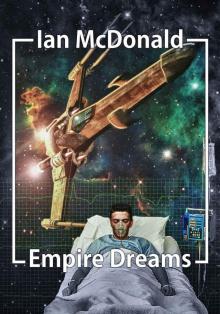 Empire Dreams
Empire Dreams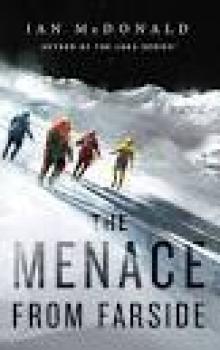 The Menace from Farside
The Menace from Farside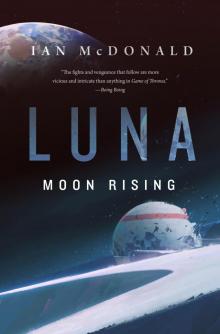 Luna: Moon Rising
Luna: Moon Rising Moon Rising
Moon Rising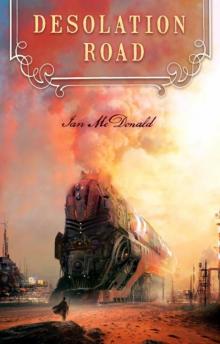 Desolation Road dru-1
Desolation Road dru-1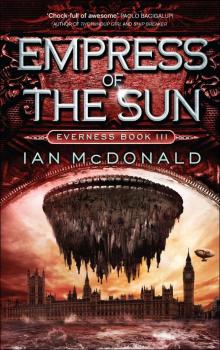 Empress of the Sun
Empress of the Sun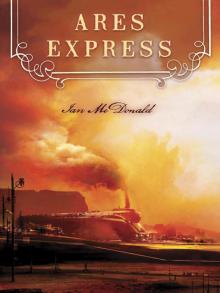 Ares Express dru-2
Ares Express dru-2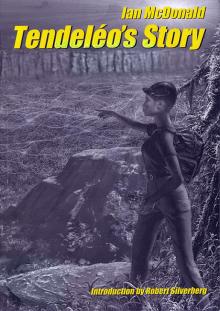 Tendeléo’s Story
Tendeléo’s Story River Of Gods
River Of Gods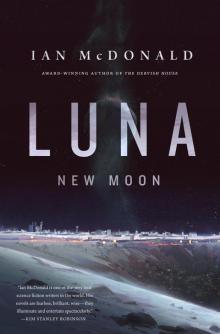 Luna
Luna![Cyberabad Days - [River of Gods 02] Read online](http://i1.bookreadfree.com/i1/03/29/cyberabad_days_-_river_of_gods_02_preview.jpg) Cyberabad Days - [River of Gods 02]
Cyberabad Days - [River of Gods 02]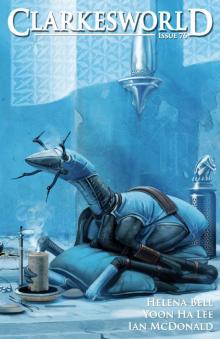 Clarkesworld Magazine Issue 76
Clarkesworld Magazine Issue 76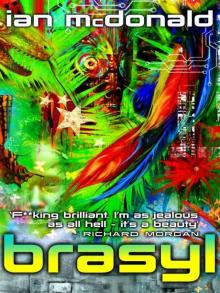 Brasyl (GollanczF.)
Brasyl (GollanczF.)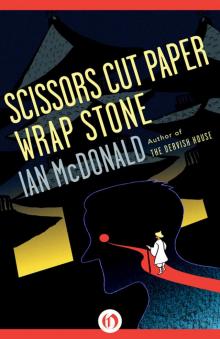 Scissors Cut Paper Wrap Stone
Scissors Cut Paper Wrap Stone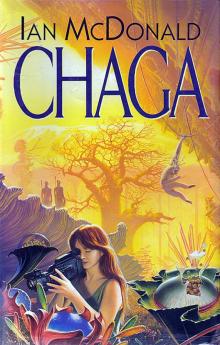 Chaga
Chaga Time Was
Time Was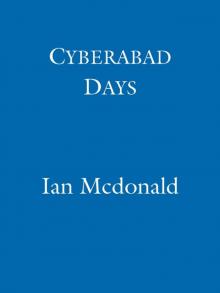 Cyberabad Days
Cyberabad Days Be My Enemy
Be My Enemy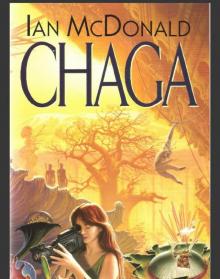 Changa
Changa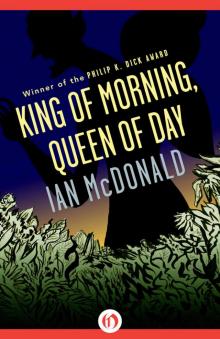 King of Morning, Queen of Day
King of Morning, Queen of Day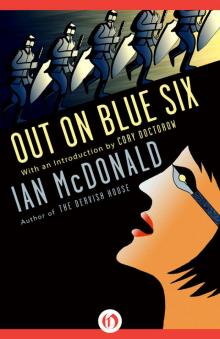 Out on Blue Six
Out on Blue Six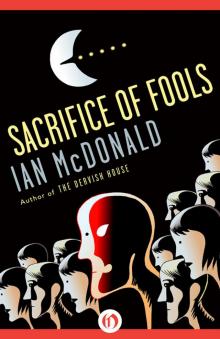 Sacrifice of Fools
Sacrifice of Fools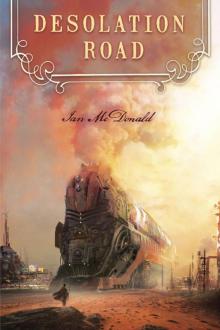 Desolation Road
Desolation Road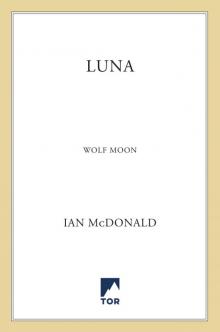 Luna--Wolf Moon--A Novel
Luna--Wolf Moon--A Novel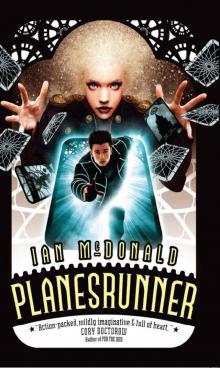 Planesrunner (Everness Book One)
Planesrunner (Everness Book One)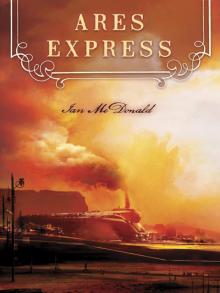 Ares Express
Ares Express